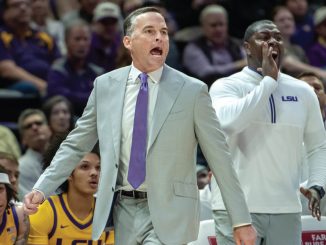
William F. Tate IV’s abrupt departure as LSU president to take the same role at Rutgers did not come as a shock to anyone who watched Louisiana politics unfold this winter. When Gov. Jeff Landry took office in January, many observers predicted that Tate’s days in Baton Rouge were numbered. Political reporter Piper Hutchinson told Tiger Rag Radio that though she could not definitively report it Tate likely was shown the door once Landry insisted on installing his own allies at the university.
Tate leaves behind a historic four-year run as the first Black president in Southeastern Conference history, and LSU athletics is feeling the void. He was more than a campus administrator; he was a visible booster at football games, basketball matchups and fan events. There was Tate, decked out in purple and gold, celebrating sideline victories, cutting down nets with the women’s basketball team and posing for photos in the basketball practice gym that bears his portrait. His presence sent a clear message: Athletics mattered to LSU’s mission.
Now, amid questions about Landry’s priorities, the pressing issue is whether Tate’s successor will embrace that same unity of academics and athletics. Historically, LSU presidents have played decisive roles in sports decisions — from Mark Emmert’s hiring of Nick Saban to Governors Bobby Jindal and John Bel Edwards weighing in on coach contracts. Under the new administration, those choices will rest in the governor’s hands, and Landry has shown little appetite for athletic extravagance.
Athletic Director Scott Woodward also faces renewed scrutiny. Hired before Tate’s arrival and under a previous governor, Woodward may find his authority tested by a new president aligned with Landry’s fiscal conservatism. Much hinges on the performance of Brian Kelly, LSU’s high-profile football coach, whose own preference for administrative cohesion helped seal his hiring. Will the next president share Kelly’s vision of seamless support between the athletic department and academic leadership? LSU’s sports future, and its donors, will be watching closely.
Across the country in New Brunswick, N.J., Rutgers University is banking on Tate to inject new energy into its programs. The Scarlet Knights have made no secret of their goal to climb the Big Ten pecking order, and landing Tate is a statement of intent. His first major assignment — hiring a new athletic director — will test his skill in capital generation and sports management. As Jerry Carino of the Asbury Park Press writes, Tate’s knack for fundraising and his genuine passion for college athletics set him apart. Rutgers faces its own challenges, operating in a crowded professional sports market that dwarfs Baton Rouge’s college-town culture. Even so, Steve Politi of the Newark Star-Ledger notes that Tate’s broad view of a university president’s role — from fundraising to student success — could be the difference-maker. While LSU may rue the loss of its most ardent sports champion in decades, Rutgers stands to gain a leader whose heart has long beat in rhythm with the roar of the crowd.




Be the first to comment